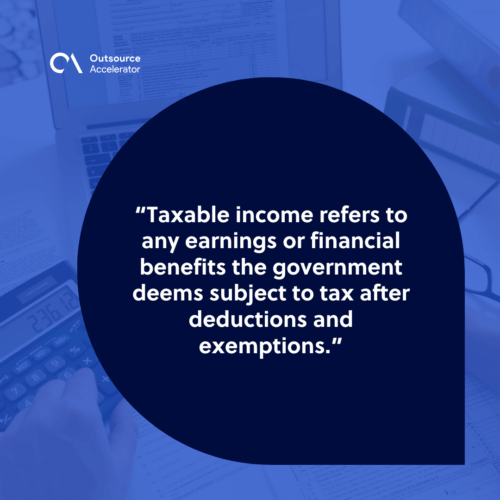Taxable income: What counts and what doesn’t

Tax obligations are an undeniable part of running a business. In line with this, it is crucial to distinguish taxable income from non-taxable earnings – and remain informed of any applicable exemptions.
Lack of awareness can result in penalties, excess payments, or missed deductions that could otherwise reduce tax liability within legal bounds.
This article is here to help you navigate tax obligations effectively.
What is taxable income?
Taxable income refers to any earnings or financial benefits the government deems subject to tax after deductions and exemptions.
Businesses and individuals can generate taxable income from various sources, including:
- Employment wages and salaries
- Business profits
- Investment income (e.g., dividends, interest, rental income)
- Compensation payments
- Gambling winnings and prize money (including lottery earnings)
- Strike benefits received from a union

Common types of taxable income
The most common type of taxable income is employee compensation, but there are other sources of income that are subject to taxation.
Earned income
Earned income includes salaries, wages, bonuses, and commissions received by a laborer. Employers deduct income tax before disbursing salaries.
Compensation in stock options, fringe benefits, and employer bonuses also fall under taxable earnings.
Investment and passive income
Investment earnings, which cover income from financial assets like interest from savings accounts, stock dividends, capital gains from selling assets, and rental income, are taxable.
Passive income, such as royalties from books or patents is also subject to taxation. Even cryptocurrency transactions generate taxable events when gains occur from trading or converting digital assets.
Partnership income
Business partners must report income based on their share of company profits. Partnership agreements define each partner’s earnings, which are taxable as part of personal income.
Unlike corporate dividends, partnership income passes through directly to partners, requiring them to include it in tax filings.
For example, if a partnership earns $200,000 in profits and has two equal partners, each must report $100,000 as taxable income on their tax return.
Any additional distributions from the partnership for personal use are taxable.
Business and self-employment income
Self-employed individuals and freelancers must declare all revenue earned from selling goods, providing services, and consulting fees for tax purposes. For example, a freelance graphic designer earning $50,000 must report this as taxable income.
For businesses, taxable income is determined after deducting operating expenses, such as rent, employee wages, and the cost of supplies. The remaining net income is subject to tax, depending on the business structure.
Further, sole proprietors and independent business owners must report all payments received – including those from international clients – to ensure full tax compliance.
Types of non-taxable income
Certain forms of income are legally exempt from taxation. However, while these earnings may not be taxed, some may still need to be reported on tax returns for transparency.
Gifts and inheritances
Money or assets received as a gift or inheritance do not count as taxable income (if you are the recipient). Rather, the person giving the gift or the deceased’s estate is responsible for any tax obligations.
However, tax laws vary by country. Certain high-value monetary gifts may require reporting, but recipients are not liable for taxes on the amount received.
Life insurance payouts
Beneficiaries who receive life insurance payouts are generally not required to pay taxes on these funds. Since life insurance is intended to provide financial security for surviving family members, tax authorities do not classify these payouts as taxable income.
Food and travel allowances
Employers may provide allowances for meals and travel, which can be tax-exempt if they meet specific criteria.
Work-related meal stipends, daily travel allowance, and lodging reimbursements fall under non-taxable income. Excessive allowances beyond reasonable limits, though, may be considered taxable.
Disaster relief assistance
Financial aid provided for natural disasters, emergencies, or public crises does not fall under taxable income. This includes government-issued relief funds, assistance from non-profit organizations, and humanitarian grants.
Since these funds are meant to support recovery rather than provide financial gain, they are exempt from taxation under most regulations.

Classify your taxable income and stay tax-efficient
Keeping accurate financial records and understanding tax obligations can help you plan finances effectively while maximizing deductions and credits. Without proper classification, you risk overpaying taxes or facing penalties for underreporting.
If you’re unsure whether certain earnings count as non-taxable or taxable income, you may talk to a tax specialist or accountant. They can assist you in identifying legitimate deductions and exemptions to reduce tax burdens.







 Independent
Independent




